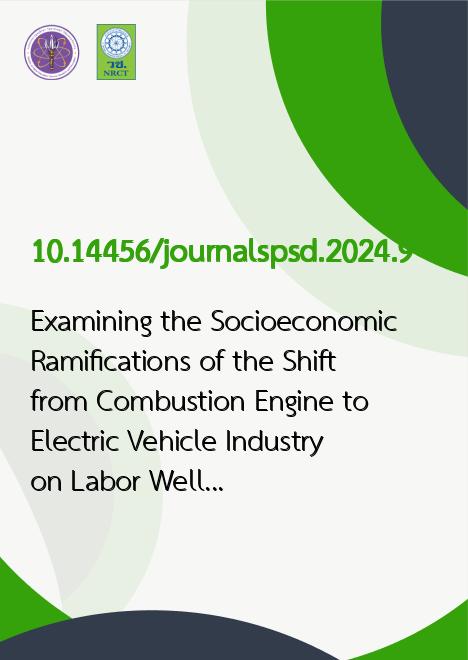
|
Examining the Socioeconomic Ramifications of the Shift from Combustion Engine to Electric Vehicle Industry on Labor Well-being in Thailand: An In-Depth Economic Welfare Analysis |
|---|---|
| รหัสดีโอไอ | |
| Creator | Chanakarn Hongchan |
| Title | Examining the Socioeconomic Ramifications of the Shift from Combustion Engine to Electric Vehicle Industry on Labor Well-being in Thailand: An In-Depth Economic Welfare Analysis |
| Publisher | Faculty of Social Administration, Thammasat University |
| Publication Year | 2567 |
| Journal Title | Journal of Social Policy, Social Change and Development |
| Journal Vol. | 2 |
| Journal No. | 1 |
| Page no. | 45-55 |
| Keyword | Electric vehicle, Labor market, Economic welfare analysis, Thailand, Government policy |
| URL Website | https://so10.tci-thaijo.org/index.php/journalspsd/issue/view/146 |
| Website title | Journal of Social Policy, Social Change and Development |
| ISSN | 2985-0800 |
| Abstract | This research article constitutes a review-oriented investigation that specifically examines the implications of the transition from internal combustion engines to electric vehicles (EVs) in Thailand on the labor market and worker well-being. The study systematically analyzes existing literature and reports exploring the historical evolution of the combustion engine industry, the emergence of EVs, and their impact on labor through an economic welfare assessment. The researchers highlight the imperative for government intervention and assistance in ensuring an equitable transition, underscoring the role of Chinese investments in advancing both the EV industry and workforce skills. The literature review reveals that Thailand's automotive sector is undergoing a transformative phase driven by the increasing global demand for EVs. While this shift presents new employment prospects in the EV sector, it also poses risks of job displacement and wage disparities in the conventional vehicle industry. In response to these challenges, the researchers propose a comprehensive approach involving collaboration among the government, private sector, educational institutions, and internal stakeholders. Key strategies encompass workforce retraining, social protection measures, labor policies, and targeted regional development to mitigate the adverse effects of the transition on workers. Significantly, the research paper accentuates the noteworthy role played by Chinese investments in Thailand's EV industry. These investments have strengthened manufacturing capabilities, expanded charging infrastructure, and facilitated research and development collaborations. When coupled with supportive government policies, Chinese investments are instrumental in expediting the transition to electric mobility in Thailand. This paper relies on a secondary literature review employing a systematic approach to synthesize and present the research findings. |